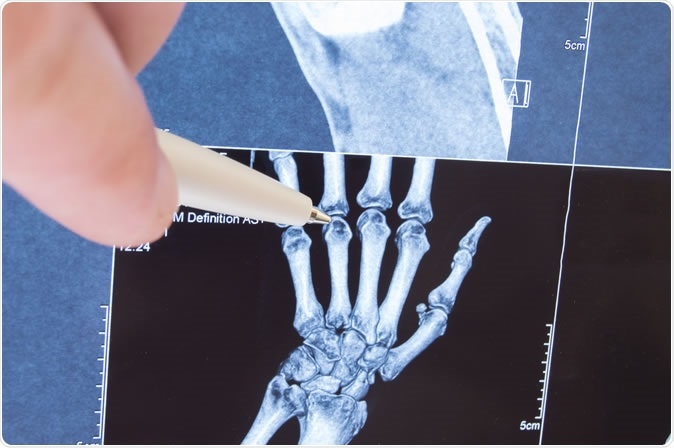Juvenile immune arthritis (JIA) is a severely undertreated condition, and new medications are badly needed to relieve the signs and symptoms of the illness, according to a new study presented at the 2019 ACR/ARP Annual Meeting.
Like other autoimmune conditions, JIA is due to a hyperactive immune system that attacks the body’s own joint tissues. This results in cartilage destruction, pain and stiffness, and restriction of joint mobility. Eventually the joint may be severely deformed.

No studies have assessed the effect of methotrexate (MTX) in osteoarthritis of the hand (HOA). The purpose of this study was to examine the effect of MTX on pain and structural progression in symptomatic erosive HOA (EHOA). Image Credit: Shidlovski / Shutterstock
The problem
Along with pain-relievers and anti-inflammatory drugs, disease-modifying anti-rheumatic drugs (DMARDs) are used to manage this condition. These include methotrexate, sulfasalazine and gold salts, all of which reduce immune activation and thus, hopefully, prevent further attack on the joints.
Recently, these have been supplemented by biologics. These drugs are biological molecules that modulate the function of the immune system at selected steps. Several biologics are used in JIA within the US, such as etanercept, adalimumab, abatacept, tocilizumab and canakinumab. Etanercept and adalimumab inhibit the inflammatory molecule tumor necrosis factor (TNF), while abatacept inhibits the immune cells called T cells that actually attack the target molecules and cells on behalf of the immune system. Tocilizumab is an IL-6 antagonist, acting on another inflammatory molecule, while canakinumab binds to IL-1β to neutralize its inflammatory activity.
Despite the use of these drugs, up to a tenth of children with JIA still show signs of active disease after switching between multiple biologics. At this point, they are often treated with other drugs that were not originally licensed for this condition. These include medications which have already undergone full testing and have been shown to be safe and effective in adults with inflammatory arthritis. Some obvious examples include other TNF inhibitors like infliximab, the IL-1 receptor antagonist anakinra, the cell-mediated immunity promoter rituximab that targets the CD20 antigen, secukinumab which inhibits IL-17A, tofacitinib which is a Janus kinase inhibitor, and the IL-12/ IL-23 blocker ustekinumab. None of these have, unfortunately, been routinely used in JIA.
The current study is meant to address this gap, by showing how these young patients need more medication options for successful treatment. In other words, both approved and off-label medications must be studied in trials of JIA patients to establish their safety and effectiveness, according to researcher Timothy Beukelman. This will help the large minority of children who don’t respond to any available treatment, or who are on non-approved drugs.
The study
The data used in this study was retrieved from about 1600 children with JIA treated at one hospital from 2008 onwards. These patients were assessed for their medication use as well as the level of disease activity. They also examined the data on disease activity and medication use by about 7400 children at their last visit, taking this information from the Childhood Arthritis and Rheumatology Research Alliance (CARRA) registry. Medication failure was assessed only in patients with complete data availability was.
Definitions
In this study, ongoing medication need refers to JIA activity even after using two or more biologics in sequential order as advised.
Active JIA denotes (1) physician global assessment as 3 or more on a scale of 1-10, where zero signifies disease inactivity, where the patients had joint inflammation in 3 or more joints, or (2) patient global assessment on a scale of 1-10, zero being very well, of 3 or more.
The findings
In both sets of data, the researchers found that biologics were used in over half of patients – 53% and 65% of the first and second groups respectively. The most common indication for biologics was systemic JIA and JPSA/ERA, and about 10% of these patients in either group failed to respond to 2 or more biologics.
Most patients in the first group had systemic JIA (9%) or multi-joint JIA (40%), or juvenile psoriatic/enthesitis-related arthritis (JPSA/ERA – 17%). In the second group, multi-joint involvement was present in 46%, systemic manifestations in 8%, and JPSA/ERA in 18%.
In 16% of the patients in the first group, only a single joint was involved, and these were least likely to receive biologics. Systemic JIA and JPSA/ERA patients were treated with biologics in about 80% of cases.
When ongoing medication need was analyzed in about 490 and 1,200 patients from these two groups, the researchers found that about 52% and 45% of patients in each group were showing significant disease activity even though they had been treated with two or more biologics. In the first group, 5% had failed to respond to 5 or more different biologics.
Next, they looked at how many patients were on unapproved medications. They found 37% and 24% of patients in the first and second groups.
Implications
Pointing out that this shows the need for new drugs to treat JIA, the researchers say, “Only if FDA demands studies from the pharmaceutical companies as part of their drug development program, will pediatric rheumatologists have valid information about the proper dosing, efficacy and preliminary safety of new medications. Further, FDA approval greatly increases access of JIA patients to new medications.”
In other words, the researchers promote new studies to validate the use of novel medications approved for adult autoimmune arthritis as and when they are approved by the FDA, so that they can fill this gap in JIA, and expand the number of patients under successful treatment.
Journal reference:
Brunner H, Schanberg L, Kimura Y, Dennos A, Eakin G, Co D, Colbert R, Fuhlbrigge R, Goldmuntz E, Kingsbury D, Mintz S, Onel K, Patty-Resk C, Rider L, Schneider R, Watts A, von-Scheven E, Lovell D, Beukelman T, and CARRA Registry Investigators f. New Medications Are Needed for Children with Juvenile Idiopathic Arthritis [abstract]. Arthritis Rheumatol. 2019; 71 (suppl 10). https://acrabstracts.org/abstract/new-medications-are-needed-for-children-with-juvenile-idiopathic-arthritis/. Accessed November 11, 2019.